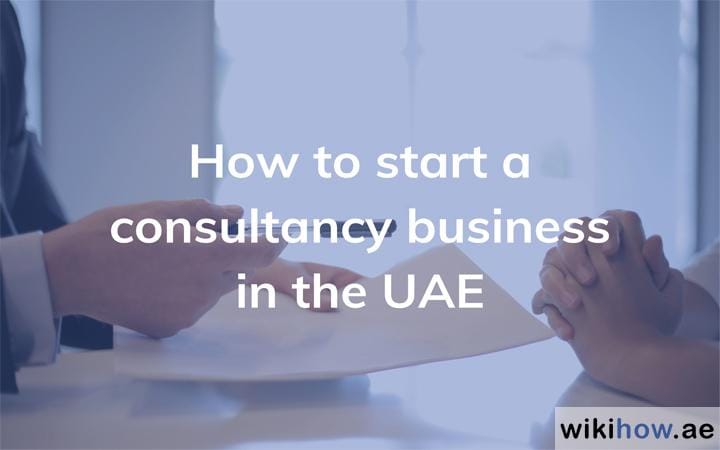How to Start a Consultancy Business in UAE?

Starting a consultancy business in UAE can be quite lucrative and promising due to its encouraging business environment and the demand for consulting services on practically all aspects. This guide covers everything from understanding the UAE market to legal requirements and effective marketing strategies for consultancy businesses.
Understanding the UAE Consultancy Market
The consultancy industry in the UAE has grown significantly, with a huge demand for professional advice in industries such as finance, health, technology and real estate. Driven by a high economy and strategic location in the Middle East, there are multiple opportunities waiting for a consultant in the UAE. To start a company in the UAE, it is better to familiarize yourself with the advantages and challenges of the field in question.

Why Start a Consultancy Business in the UAE?
Starting a consultancy business in the UAE is an excellent opportunity for entrepreneurs and professionals seeking growth in a thriving market. The nation has established itself as a major international center for innovation, trade, and finance, particularly in Dubai and Abu Dhabi. The UAE offers the ideal setting for consultants to thrive because of its advantageous location that links Asia, Europe and Africa, as well as its state-of-the-art infrastructure and business-friendly laws. It is one of the most promising markets for consulting firms due to the growing demand for professional advisory services across industries, and there are many reasons to start a business in UAE that make it especially attractive for entrepreneurs.
Benefits of opening a consultancy in Dubai
There are many benefits to starting a consultancy in Dubai, which draws professionals from around the world. With tax breaks, free zone access, and, frequently, 100% foreign ownership, the city provides a business-friendly atmosphere. A consistent stream of prospective customers from a variety of industries is guaranteed by its global standing as a financial and commercial center. Additionally, Dubai’s innovative economy, global connectivity and cosmopolitan lifestyle make it the perfect place for consulting firms to grow.
Key industries for consulting services in 2026
Strong demand for consulting services is anticipated in a number of UAE industries in 2026. As companies look for advice on AI, cybersecurity and cloud solutions, technology and digital transformation will continue to be at the forefront. In line with the UAE’s sustainability objectives, the renewable energy industry will also need professional guidance on implementation and strategy. In addition, the high-growth industries of real estate, healthcare and finance will all continue to benefit from the insights and customized solutions that consulting firms can offer.
UAE Consulting Market Overview
One of the most vibrant and rapidly expanding industries in the Middle East is the consulting market in the United Arab Emirates. Expert consulting services are in high demand across a variety of industries, including finance, technology, healthcare, real estate, and sustainability, thanks to the nation’s strategic vision for diversification beyond oil. The UAE government’s dedication to global competitiveness, smart cities and innovation has further established the market as a hub for both domestic and foreign consulting firms seeking to make a significant impact.
Growth trends and statistics in GCC region
Over the past ten years, the GCC’s consulting sector has grown steadily, with the UAE spearheading the expansion. Market reports indicate that the GCC’s consulting services are expected to grow at an average annual rate of 7–10% due to the region’s extensive infrastructure projects, digital transformation programs, and economic diversification plans like Saudi Vision 2030 and UAE Centennial 2071. There is a constant need for knowledgeable advisors in fields like management consulting, IT and sustainability as a result of these expansive national plans.

Opportunities and challenges for new firms
In the UAE, there are many opportunities for new consulting firms, but there are also significant obstacles. On the plus side, sectors like healthcare, renewable energy, and fintech are growing quickly, creating opportunities for specialized consultants. The market is extremely competitive, though, so newcomers must set themselves apart with specialized knowledge, creative solutions, or local understanding. To thrive in this cutthroat environment, businesses must overcome three major obstacles: cultural sensitivity, regulatory compliance, and establishing client trust.
Competitive landscape for consultants in the UAE
Global behemoths like McKinsey, BCG and Deloitte coexist with local businesses and boutique consultancies in the fiercely competitive UAE consulting market. Large-scale projects are dominated by established players, but smaller businesses that provide more specialized knowledge or flexible services are becoming more and more popular. Opportunities for new businesses are also created by the growth of digital consulting and the need for customized, affordable solutions. In this rapidly changing environment, consultants must constantly innovate, make use of technology and cultivate solid client relationships in order to remain competitive.
Benefits of Starting a Consultancy in UAE
Consulting in the UAE is a hub of diverse opportunities. Some of them are:
- Access to a Diversified Market: As the UAE attracts business from every part of the world, consulting demand is sought in various sectors.
- Taxation Incentives: The UAE implements beneficial policies in regard to taxation, such as zero personal income tax as well as zero corporate tax in some free zones.
- Infrastructure and Connectivity: The UAE provides first-class infrastructure with an international business atmosphere, a reservoir of experienced expatriate professionals and a sound regulatory framework.
Legal Requirements and Regulations
Starting a consultancy in the UAE involves adhering to certain legal aspects, including the type of license required which might be mainland, free zone or offshore, followed by registration with the pertinent authorities, and necessary ownership structure requirements. Consultants further need to obtain a permit, check on labor and visa legislation and comply with obligations such as tax registration under the UAE’s laws.

Consultancy License Types in the UAE
Getting the appropriate license is essential when starting a consulting business in the United Arab Emirates because it dictates how you can conduct your business, where you can locate your office, and the types of clients you can serve. Through its mainland, free zones, and freelance permits, the UAE provides a variety of licensing options that allow business owners to tailor their organizational structure to their objectives. Building a profitable, scalable and compliant consulting business in the nation requires an understanding of these license types.
Mainland vs. Free Zone consultancy license
Entrepreneurs can choose between a mainland or free zone setup when applying for a consultancy license in the United Arab Emirates. A mainland license gives you the most market access and permits you to work with both public and private clients throughout the United Arab Emirates without any limitations. A free zone license, on the other hand, is typically more affordable, offers complete profit repatriation and might come with alluring tax advantages. However, unless further approvals are obtained, it usually restricts you to clients in the free zone or foreign markets, making it important to explore the best ways to start business UAE free zone for your consultancy.
Freelance permits and 100% foreign ownership
Freelance permits are a desirable choice for freelancers or small-scale professionals. These permits, which are available in specific free zones, let people legally provide consulting services without having to set up a full-fledged business. Additionally, the UAE has implemented reforms that remove the need for a local sponsor and permit 100% foreign ownership of consulting firms in numerous industries. For foreign businesspeople wishing to establish a presence in the UAE, this makes the market more approachable and alluring.
Choosing the right legal structure for your firm
One of the most crucial steps in establishing a consultancy in the United Arab Emirates is choosing the appropriate legal structure. Limited liability companies (LLCs), civil companies and sole proprietorships are among the options available; each has advantages and requirements of its own. While LLCs are best suited for businesses that intend to grow with several partners, sole proprietorships are appropriate for independent consultants. The size of your company, the range of services you offer, and your long-term growth plan are some of the variables that determine the best structure. Efficient operations and regulatory compliance are guaranteed by meticulous planning.
Steps to Register Your Consultancy Business
Starting a consultation in the UAE requires the following steps:
- Identify the Niche and validate your idea: First you should identify your niche and validate your idea. This way, you will be confident that your consultants will be availed by both demand and supply in the UAE market.
- Apply for a Consultancy License: A license application has to be forwarded to DED or the concerned free zone authority.
- Name of Business: Ensure it is under the naming conventions of UAE and culturally sensitive to your target audience, consistent with your brand.

Define your business activity and trade name
Choosing a trade name and precisely defining your business activity are the first steps in launching a consulting firm in Dubai. Your selected activity needs to be in line with the consulting services you intend to provide, such as financial, marketing, IT, or management consulting. Simultaneously, your trade name should reflect your brand identity and adhere to UAE naming regulations by avoiding restricted words. Since it serves as the foundation for your license application, this step is crucial.
Apply for your consulting license (DED or free zone)
The next step is to apply for a consultancy license after your name and activity have been accepted. You can work with clients all over the United Arab Emirates if you decide to operate under the Department of Economic Development (DED). This will grant you a mainland license. As an alternative, establishing your business in a free zone may restrict your ability to serve clients on the mainland without obtaining extra approvals, but it also offers tax advantages, 100% foreign ownership and streamlined procedures. Your target market and business plan will determine which licensing authority is best for you.
Set up your office space (virtual or physical)
Depending on your business model, you may need to set up a physical or virtual office space after obtaining your license. For consultants who don’t need a permanent workspace, many free zones provide virtual office or flexi-desk options. Having a physical office in Dubai, however, can boost credibility, offer a formal setting for meetings, and possibly even be necessary to obtain some licenses. Selecting the appropriate configuration guarantees cost effectiveness while satisfying operational requirements.
Open a corporate bank account in the UAE
Opening a corporate bank account is the last step in starting your consultancy. This is necessary for handling client payments and preserving financial transparency. To open business account in UAE, banks usually need your trade license, incorporation documents and evidence of business activity. Having a corporate bank account not only fosters client trust but also facilitates seamless financial operations and access to other banking services, even though the process can be demanding because of compliance checks.
Financial Planning and Budgeting for the Consultancy
A consultancy start-up has to make provisions for the following:
- Licensing and registration fees
- Renting office space
- Marketing and branding
Precise budgeting will prevent unforeseen financial upsets.
Cost and Timeline to Start a Consultancy in UAE
Financial planning and a thorough grasp of the setup timeline are essential when starting a consulting business in the United Arab Emirates. The size of your office, the number of visas you need, and whether you select a mainland or free zone license all affect the cost. Additionally, compared to other international markets, the UAE can be reached quickly, which makes it a desirable location for consultants looking to start their companies.
Breakdown of license, office and visa fees
Starting a consultancy in the United Arab Emirates usually entails paying for office space, a business license, and visa fees. Depending on the jurisdiction and setup type, a consulting license can cost anywhere from USD 4,000 to USD 10,000. The cost of office space varies; flex desks or virtual offices are less expensive than fully furnished physical offices. Additionally, investor and employee visas may add USD 1,000 to USD 3,000 per person. The chosen free zone or mainland authority will determine the actual costs, even though these are only estimates.
Estimated timeline from setup to operation
It usually only takes a few weeks to start a consultancy in the United Arab Emirates. While initial paperwork and trade name approval can be finished in a few days, license issuance can take anywhere from five to ten business days, depending on the authority. An additional one to two weeks may be needed for office setup and visa processing. If all documentation is in order and all requirements are fulfilled, the majority of consulting firms can be fully operationalized in 3–6 weeks.

Banking and Financial Management in UAE
To segregate the business finances, opening a business bank account is a must in the UAE. All the UAE banks are pretty particular about the documentation requirement. You may require:
- Trade license copy
- Passport and visa copies of all the shareholders
If you require finance, a range of financial products is available through either banks or investment houses in the UAE.
Hiring and Visa Requirements
When starting a consultancy in the UAE, understanding the rules around hiring and visa requirements is essential for smooth operations. Both mainland and free zone authorities provide guidelines for staffing and visa allocation, ensuring that businesses comply with local labor laws. Whether you plan to recruit a small team or expand into a larger consultancy, being aware of these requirements helps streamline the setup process and avoids regulatory issues.
Recruiting staff for your consultancy
Depending on the level of experience needed, UAE consulting firms can choose to employ both domestic and foreign experts. All workers must have current work permits and residency visas sponsored by the business, whether they are hired directly or through authorized agencies. In addition to taking into account Emiratization policies that promote hiring UAE nationals, many consultancies favor hiring qualified foreign workers with industry-specific expertise. Gaining the trust of clients and providing top-notch consulting services depend on having a solid team.
Visa allocation rules for mainland and free zones
The type of business license and the jurisdiction of setup determine which visas are granted in the United Arab Emirates. With visa quotas based on office size and Ministry of Human Resources approvals, mainland businesses frequently enjoy greater flexibility. In contrast, free zones typically grant a set number of visas for each license package; this number can be raised by upgrading the license type or office space. Planning your workforce and making sure you have the necessary capacity to expand your consultancy require an understanding of these guidelines.
Marketing Strategies for a New Consultancy
The primary two purposes of any marketing strategies for a new consultancy are awareness and credibility. Some of the ways through which this can be achieved are as follows:
- Networking Events: Attending industry events and seminars.
- Online Presence: Through social media, professional website and search engine marketing.
Networking and Building a Client Base
The key to any business is networking. Business conferences and trade associations are great places for contacts to be made with possible clients.
Business Growth Strategies for Consultants
As your consultancy grows, the following approaches may be considered:
- Expansion into New Markets: expand into other Emirates or regional neighbors.
- Value-Added Services: Provide ancillary services either on its own or in cooperation with other service providers.

Common Mistakes to Avoid
Although there are many opportunities to start a consulting business in the United Arab Emirates, new business owners frequently make mistakes that can impede their progress. Errors can result in lost opportunities and financial strain, ranging from choosing the incorrect license type to misjudging service pricing or targeting the incorrect market. Consultants can strengthen their foundation for long-term success and sustainability in the cutthroat market of the United Arab Emirates by being aware of these pitfalls.
Choosing the wrong setup or license
Selecting an inappropriate business structure or license is one of the most frequent errors made by new consultants. For instance, choosing a free zone license may appear to be more economical, but unless further approvals are secured, it may restrict access to mainland clients. The services you are legally permitted to provide may also be limited if you choose the incorrect business activity on the license. Compliance and increased market access are ensured by taking the time to comprehend the distinctions between mainland, free zone and freelance permits and matching them with your company’s objectives.
Mispricing your services or targeting the wrong market
Mispricing consulting services or failing to determine the appropriate target audience are two more common errors. In a competitive market, charging too much can drive away potential customers, while charging too little can diminish your expertise. Similarly, focusing on industries with little demand or not tailoring services to local business cultures can hurt your company’s chances of success. Consultants should benchmark against competitors, carry out in-depth market research and create pricing strategies that strike a balance between perceived value and affordability in order to prevent this.
Conclusion
Various benefits accrue from Starting a consultancy business in the UAE, including an ever-growing diverse market, tax incentives and solid infrastructure. In establishing a consultancy, entrepreneurs have to make a decision between setting up on the mainland and a free zone, each offering different benefits regarding ownership, cost and flexibility of the business. Key considerations would then involve the selection of an area of specialization, licensing, naming the business and instituting systems of financial management, such as banking and budgeting.
Other viable marketing strategies that new consultancies should consider are networking, online marketing and industry events. For compliance layered with long-term success, it would refer to legislation tied to UAE laws on licensing, renewals and the compelling need for annual audits. Despite several challenges at the outset, like straggling licensing and stiffened competition, a consultancy without compromising its strategy, will successfully carve a niche for herself and grow in the UAE.
FAQs
1. What is the minimum capital required to start a consultancy in UAE?
The minimum capital varies depending on the free zone or mainland regulations, but many free zones do not have a minimum capital requirement for consultancy businesses.
2. Can I own 100% of my consultancy business in the UAE?
Yes, foreign nationals can fully own businesses in many UAE free zones. For mainland businesses, 100% ownership is allowed in certain industries under recent UAE laws.
3. How long does it take to start a consultancy business in the UAE?
The licensing process can vary, but typically takes 2–4 weeks if all documentation is in order.
4. What are the best free zones for consultancies in the UAE?
Popular free zones include Dubai Multi Commodities Centre (DMCC), Abu Dhabi Global Market (ADGM) and Sharjah Media City (Shams).
5. Which free zones are best for consulting firms?
Popular options include DMCC, Dubai Internet City, Dubai Knowledge Park and ADGM for their flexibility and cost-effective packages.
6. Do I need a physical office to get licensed?
Not always, many free zones accept virtual or flexi-desk offices, but mainland setups often require a physical office.





